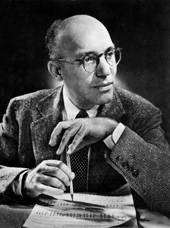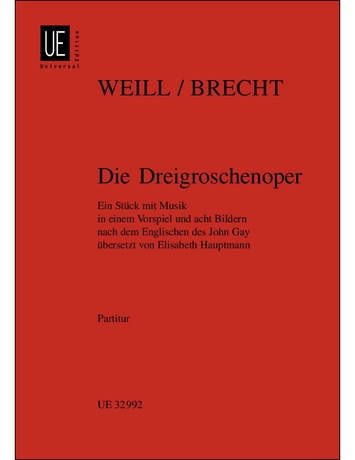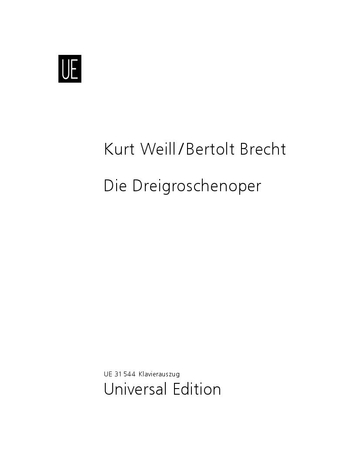

Kurt Weill
Die Dreigroschenoper
Short instrumentation: 0 0 0 0 - 0 1 1 0 - sop.sax(Bb), alto sax(Eb), bar.sax(Eb), t.sax(Bb), bjo, harm, timp
Duration: -'
Übersetzer der Textvorlage: Elisabeth Hauptmann
Herausgeber: Edward Harsh, Stephen Hinton
Klavierauszug von: Kurt Weill, Norbert Gingold
Text von: Joseph Rudyard Kipling, John Gay, François Villon
Libretto von: Bertolt Brecht
Übersetzer: Karl Anton Klammer, Michael Feingold
Roles:
Jonathan Jeremiah Peachum
head of a gang of beggars Mrs. Peachum Polly Peachum
their daughter Macheath
head of a gang of crooks Brown
Chief of London Police Lucy
his daughter Macheath's gang
street bandits: Walt Dreary
Crook Finger Jack
Matt of the Mint
Sawtooth Bob
Ed
Jimmy Filch
one of Peachum's beggars Jenny Diver
a whore Smith
a police constable Reverend Kimball Beggars
Whores (Dolly
Betty
Vixer
Molly
and others)
Policemen
Instrumentation details:
alto saxophone in Eb (+fl
picc
cl(Bb)
sop.sax(Bb)
bar.sax(Eb))
tenor saxophone in Bb (+cl(Bb)
bsn
sop.sax(Bb))
trumpet in C
trombone (+cb)
banjo (+band
vc
guit
hawaii guit
mand)
timpani (+perc)
harmonium (+pno
cel)
Weill - Die Dreigroschenoper
Printed/Digital
Translation, reprints and more


Kurt Weill
Weill: Die Dreigroschenoper (The Threepenny Opera) for voices, choir and orchestraOrchestration: for voices, choir and orchestra
Type: Studienpartitur

Sample pages
Audio preview
Work introduction
The idea for the Dreigroschenoper [“Threepenny Opera”] came from Elisabeth Hauptmann, Bertolt Brecht’s widely-read employee, who had heard of the enormous success of the 1920 revival of John Gay’s old English Beggar’s Opera (music by John Christopher Pepusch) at London’s Lyric Theatre. She made a rough translation of Gay’s text for Brecht, and it became one of his many current projects.
Brecht was intrigued by the story, set in a milieu of beggars, whores and thieves; it seemed the perfect form in which to cast his criticism of the bourgeoisie. In adapting it, he transferred the action to the Victorian era of the 19th century and turned Gay’s “disguised critique of public disgrace” into a “public critique of disguised disgraces,” in Werner Hecht’s phrase. “It no longer aims at the cream of society; it strikes out at ‘normal bourgeois existence,’ as it were.”
Not a note had been written yet when Brecht was introduced to the idea; he made it a condition of accepting the commission from Josef Aufricht that Kurt Weill should compose the music. Time was scarce, so Brecht and Weill travelled with their wives in May 1928 to southern France, where they could work undisturbed.
The opera was finished in late July and rehearsals began early the next month for the premiere performance on 31 August at Berlin’s Theater am Schiffbauerdamm, where it was a colossal success. By contrast, the first American performance, on Broadway in 1933, was an outright failure, due to a poor translation and inadequate staging; it closed after 12 performances.
Lotte Lenya played Jenny in the 1956 revival, an adapted version by Marc Blitzstein at a Greenwich Village theatre, where it played for over 2000 performances. Today, the Dreigroschenoper is one of the most frequently produced musical dramas of the 20th century.
(Partially taken from Jürgen Schebera, Kurt Weill, Deutsche Verlag für Musik, Leipzig 1990, pp. 90 et seq.)
